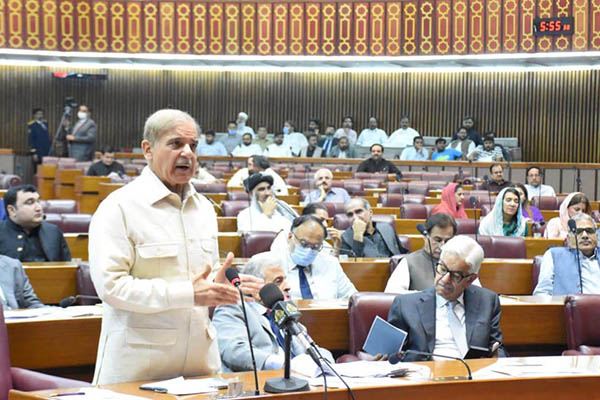
Photo courtesy PID
Ruling coalition lawmakers on Wednesday called for judicial reforms in the National Assembly, with ministers, including Prime Minister Shehbaz Sharif, deriding the “dual standards” of justice for the government and the opposition Pakistan Tehreek-e-Insaf (PTI).
In a lengthy speech, the prime minister reacted to the Supreme Court’s declaring Pakistan Muslim League (Quaid)’s Pervez Elahi the new chief minister of Punjab by ruling the election of PMLN’s Hamza Shahbaz “illegal,” stressing that justice should be equal for everyone. “I respect the judiciary but one has to speak the truth on the floor of the National Assembly. The judiciary cannot treat me differently from someone else,” he said.
Referring to the long-pending “foreign funding” case of the PTI, P.M. Sharif noted its judgment had not been announced despite eight years having passed since it was filed. “Did anyone take suo motu notice of that case over the last eight years?” he asked. “The PTI government provided sugar subsidies worth billions of rupees during its term and made the worst decisions during its tenure, struck deals with IMF and then ruined them, and brought Pakistan to the verge of default. But did anyone take notice of all this?” he continued.
“The National Accountability Bureau (NAB) closed [PMLQ’s] Moonis Elahi’s and the Malam Jabba case; there was embezzlement in the BRT Peshawar Project; however, no one took notice of that,” he added.
“The ladla (favorite) was treated as a blue-eyed boy and the support he received throughout his tenure, no one else has ever gotten this kind of backing in the last 75 years,” the prime minister said, referring to Khan. He stressed that court rulings should consider truth and justice.
Vowing to continue in his role as prime minister so long as he had the confidence of his party, coalition leaders, and the National Assembly, he regretted that Pakistan had not decided on its “path” despite 75 years since its creation. “They [PTI] sent a letter via WhatsApp stating that Russia will give cheap oil, while the Russian government denied any such offer,” he said, adding that the incumbent rulers had been offered wheat from Russia but would only purchase it if it were available at cost-effective rates.
The prime minister said Pakistan’s Constitution was drafted under the leadership of then-prime minister Zulfikar Ali Bhutto and vowed that it would continue to guide and strengthen the country regardless of anyone’s attempts to harm it.
Referring to the 2018 general elections, Sharif said they were the most rigged polls in the country’s history. “The Results Transmission System was closed at night and the counting of votes was stopped on the order of the former chief justice,” he recalled.
Criticizing the PTI-led government for taking loans of over Rs. 20,000 billion in just three-and-a-half years, he said millions had lost their jobs and become homeless during the previous government’s rule.
Seeking to justify the “difficult decisions” taken by the incumbent government in withdrawing subsidies and raising fuel and electricity tariffs, he said the coalition government was aware that the PTI had left Pakistan on the verge of default and had decided to save the state rather than boost its politics.
“I was offered to become the prime minister by a president in 1992; Musharraf also offered me the P.M.’s post, and when Nawaz Sharif offered me the premiership, I chose to serve Punjab instead to complete mega projects,” he said in a bid to rubbish the perception among the public that he was delaying fresh elections to stay in power.
The prime minister also announced new relief measures for people impacted by flooding, especially residents of Balochistan. Stressing the coalition government was aware of the destruction caused by torrential rainfall, he said meetings had been held with all provincial governments. “The federal government has decided to increase the relief package for those affected by the rains,” he said, adding more details would be finalized shortly.
PPP threatened
Later, during his address to the Lower House, Foreign Minister Bilawal Bhutto-Zardari said the PPP, of which he is chairman, had made a “mistake” by approving the 19th constitutional amendment that had granted the judiciary carte blanche on appointments to superior courts.
In 2011, then-president Asif Ali Zardari had signed the 19th Amendment Bill into law, laying down a new system for appointments to the superior courts aimed at neutralizing a brewing conflict between the judiciary and the executive. According to Bhutto-Zardari, his party had been warned that if the 19th amendment were not passed then the 18th would be revoked. “We caved in and passed the 19th Amendment,” he said. “We [PPP] should have stood against those who threatened the government at that time,” he added.
Referring to the Supreme Court’s refusal to form a full bench to hear a petition related to the election of the Punjab chief minister—and a subsequent ruling declaring Hamza Shehbaz’s election “illegal”—Bhutto-Zardari said it was “unfair that there is one Constitution for us [coalition] and another for the ladla.” He also rubbished claims by the opposition that a similar bench had ruled in favor of the vote of confidence that ousted Imran Khan and the incumbent government had no right to criticize the recent ruling.
“Can all sins and violations of the Constitution carried out in the last 70 years be forgiven by adopting a neutral stance for one day?” he questioned, stressing that a joint parliamentary committee should be formed for judicial reforms. “The PPP is ready for judicial reforms,” he added.
